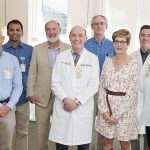Going Big Against Cancer
Read moreArchives: Grant
V Foundation Grants
Ruoning Wang, Ph.D.
Funded by the Dick Vitale Gala in Memory of Eddie Livingston
Interaction of immune system with tumor is a complex and dynamic process, which dictates tumour initiation, progression and responses to therapy. Mounting evidence indicates that strengthening the amplitude and quality of T cell-mediated adaptive response is one of the most promising approaches to enhance therapeutic anti-tumor immunity. Functional and effective immune response requires a metabolic rewiring of immune cells to meet their energetic and anabolic demands. As such, tumor microenvironment represents a dramatic example of metabolic derangement, where the highly metabolic demanding tumor cells may compromise the function of some immune cells by competing nutrients (a form of intercellular competition), meanwhile may support the function of other immune cells by forming a metabolic symbiosis (a form of intercellular collaboration). Here, we propose to decipher the metabolic communications between tumor cells and immune system and understand how such communications impact on anti-tumor immunity.
Megan McNerney, M.D., Ph.D.
Each year, in the U.S. alone, over 50,000 people are diagnosed with myeloid cancers of the blood. Some myeloid cancers have been found to lose all or a portion of chromosome 7 [-7/del(7q)], and these cases are particularly difficult to treat. The overall survival for these patients is less than one year. -7/del(7q) also occurs in half of therapy-related myeloid neoplasms/cancers (t-MN). t-MN arise as a side effect of chemotherapy/radiation and occur in u to 8% of cancer survivors. There is clearly an urgent need to develop better therapies for -7/del(7q) disease. It has long been thought that one or more genes on chromosome 7 prevents cancer growth – “tumor suppressor genes.” I used genomic technologies and animal models to map this tumor suppressor gene, implicating CUX1. The long-term goal of the current proposal is to improve the outcome for patients with this type of disease. This proposal is designed to accomplish this by identifying CUX1-regulated pathways that may be potential drug targets as well as establish animal models for future use in preclinical therapy development. The contribution of the proposed research is expected to bhe characterization of the biological outcomes and altered pathways caused by CUX1 loss–the first step toward developing therapies. The significance of this work is not limited to leukemia; CUX1 is mutated in endrometial cancer, gastric cancer, and melanoma, among other tumors. Thus, the understanding of CUX1 function in myeloid disease may guide our knowledge of the role of CUX1 in other cancers.
Karen Sandell Sfanos, Ph.D.
Human-associated bacterial communities (e.g., the “microbiome”) are an integral part of the healthy human body, yet pathogenic shifts leading to increased and/or decreased diversity in the healthy-state microbiome composition are linked to disease development. We hypothesize that prostate infections that result from pathogenic shifts in the urinary tract microbiome contribute to prostate cancer development. As such, we aim to investigate associations between altered urogenital microbiome signatures and the presence of prostate cancer and/or high grade disease. Furthermore, we aim to correlate urinary tract microbiome signatures to prostatic inflammation in prostate cancer patients, as we hypothesize that microorganisms that may contribute to prostate cancer etiology do so via the induction of chronic inflammation in the prostate. These studies can be coupled to ongoing studies in our laboratory aimed at the identification of microbial signatures in prostate cancer tissues, and ongoing efforts to identify causal microorganisms in prostate cancer etiology. The proposed research project will represent an essential initial study linking urinary tract microbiome to genitourinary disease. Whereas the project is primarily focused on prostate cancer, this work may lay the important groundwork for additional studies linking urinary tract microbiome to other genitourinary malignancies such as kidney, urothelial, or bladder cancer.
Peter S. Turk, M.D.
Funded by Papa John’s International, Inc.
Michael Zinner, M.D.
Funded by Hooters of America, LLC
Baptist Health South Florida is developing Miami Cancer Institute into a destination cancer center known for its leading clinical care, exceptional patient experience, advanced clinical research and state-of-the-art technology – including the first proton therapy center in South Florida, Latin America and the Caribbean. To accelerate its mission of hope, caring and innovation, Miami Cancer Institute has announced plans to join the Memorial Sloan Kettering Cancer Alliance, a dynamic partnership that will ultimately enable cancer patients to access potential breakthrough therapies right here in South Florida.
Tian Zhang, M.D.
Funded by friends of TK and Virginia Wetherell
Metastatic castration resistant prostate cancer (mCRPC) – prostate cancer which is resistant to androgen deprivation therapy – can be often aggressive and lethal. The androgen receptor (AR) has an important role in the disease course of prostate cancer, since both enzalutamide and abiraterone acetate improve overall survival by exerting effects on the AR pathway. Our preclinical data shows that AR can increase proteins that are needed maintaining copper balance, such as the copper transporter protein, which we found in prostate cancer samples. To take advantage of the copper biology in prostate cancer, we performed a “conditional lethal” screen for drugs that exert their cancer-killing effects based on the presence of copper. This screen identified disulfiram “Antabuse”, as a potential drug for prostate cancer. Antabuse has been tested before in prostate cancer but never in the presence of copper. Mouse models of prostate cancer have shown that those cancer masses can shrink when Antabuse is given along with copper. Therefore, we propose to study the combination of Antabuse and intravenous copper, to find the safety profile for this combination of drugs. In addition, we will study the copper uptake of these patients’ prostate cancers using a radiolabeled copper PET scan. These studies will allow us to see whether the baseline copper uptake of a patient’s prostate cancer is linked to their response on the combination of Antabuse and intravenous copper.
Kenneth Westover, M.D., Ph.D.
V Scholar Plus Award- extended funding for exceptional V Scholars
Cancer is an abnormal state wherein cells become uncontrolled in their ability to divide, grow and cross tissue borders. These cellular processes are governed by an array of signaling proteins including KRAS. Mutations in the KRAS protein result in uncontrolled signaling leading to cancer. KRAS mutations are some of the most common causes of many types of cancer. However, researchers have struggled to discover ways of treating tumors driven by mutant KRAS. The goal of this project is to develop new drugs that directly target mutant KRAS proteins. We will focus on two mutations. One is common in lung cancer, KRAS G12C. The other is common in gastrointestinal cancers, KRAS G13D.
Michael Weber, Ph.D.
Funded by Virginia Vine 2016
“Precision medicine” aims to develop better treatments by understanding the molecular causes of disease. This is essential in cancer because each type (breast, brain, or blood cancer, for example) represents dozens of different kinds of cancer at the molecular level. And each of these different molecular sub-types requires different treatments.
Based on research of the past twenty years, we understand a great deal about what drives cancers. Many drugs have been devised that specifically target these causes – molecular “smart bombs.” However, the cancer cells rapidly adapt and find escape routes. Drugs that seem to work ultimately fail. We get many hopeful responses but few cures.
Our research seeks to identify and block these escape routes. We look at the molecular changes inside cancer cells after drugs are applied, and we then use other drugs to “slam the door” so the cancer cannot escape treatment. Our approach is already proving successful: We are testing one of these combinations in people to treat Mantle Cell Lymphoma. We propose to look at similar cancers that might benefit from this approach. We also want to better understand ways that cancer cells might escape from our combination treatments. Our goal is to improve responses to therapy and turn temporary responses into real cures.
Eliezer Van Allen, M.D.
Funded by the Stewart J. Rahr Foundation PCF Challenge Award:
co-funded by The Prostate Cancer Foundation and
the 2016 V Foundation Wine Celebration Fund a Need
Nearly all patients with metastatic castration resistant prostate cancer (mCRPC) develop resistance to androgen targeting agents and ultimately succumb to their disease. Recent discoveries by our group and others have demonstrated that a significant proportion of these patients harbor somatic or germline genomic defects in DNA repair defects, and targeting this genomically defined subset with therapies affecting this pathway may impact patient care. The goal of this project is to definitively characterize the genomic and functional landscape of DNA repair defects in mCRPC, clinically test the hypothesis that tumors harboring DNA repair defects preferentially benefit from immune checkpoint blockade, and explore innovative strategies to augment the efficacy of these agents through genomic and preclinical approaches. The project described herein is the first to comprehensively bridge the DNA repair and immuno-oncology fields to directly impact patients with advanced prostate cancer. We propose an integrated strategy that leverages advances in clinical genomics, trial design, and preclinical modeling methodology pioneered by our team. Furthermore, our proposal will be the first to specifically enable immune checkpoint blockade treatment strategies for mCRPC. In summary, this project will catalyze our understanding of how DNA repair defects impact advanced prostate cancer, and how deep knowledge about these events may enable clinical development of a transformative new class of immunotherapies that are greatly needed for advanced prostate cancer patients.













